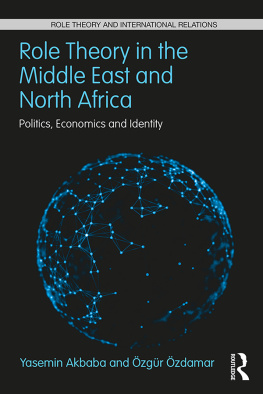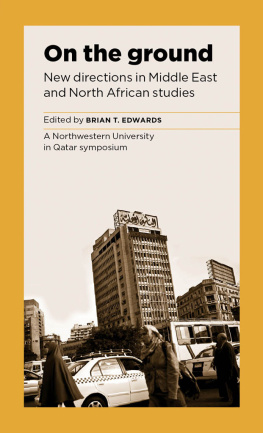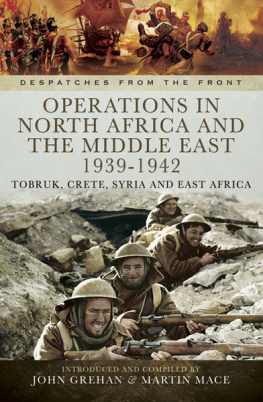Language and Identity in the Middle East and North Africa
Language and Identity in the Middle East and North Africa
Edited by
Yasir Suleiman
DEDICATION
To the memory of my father,
Ibrahim Hammad-Suleiman,
taghammadahu Allhu biwsii ramatihi wa ghufrnih.
First published in 1996
by Curzon Press
Published 2013 by Routledge
2 Park Square, Milton Park, Abingdon, Oxon OX14 4RN
711 Third Avenue, New York, NY, 10017, USA
Routledge is an imprint of the Taylor & Francis Group, an informa business
1996 Yasir Suleiman
All rights reserved. No part of this book may be reprinted or reproduced or utilised in any form or by any electronic, mechanical, or other means, now known or hereafter invented, including photocopying and recording, or in any information storage or retrieval system, without permission in writing from the publishers.
British Library Cataloguing in Publication Data
A catalogue record for this book is available from the British Library
Library of Congress in Publication Data
A catalogue record for this book has been requested
ISBN 13: 978-0-700-70410-1 (hbk)
CONTENTS
Mike Holt
Yasir Suleiman
Ibrahim Muhawi
Sarah Lawson-Sako and ltesh Sachdev
Muhammad Amara and Bernard Spolsky
idem Balim
Farida Abu-Haidar
Jacob M. Landau
Joyce Blau and Yasir Suleiman
Mohamed Tilmatine and Yasir Suleiman
Bernard Spolsky
Dr Farida Abu-Haidar
School of Oriental and African Studies, University of London
Dr Muhammad Amara
Bar-Ilan University and Beit Berl College
Dr idem Balim
University of Manchester
Dr Joyce Blau
Institut national des langues et civilisations orientales
Mr Mike Holt
University of Salford
Professor Jacob M. Landau
The Hebrew University of Jerusalem
Ms Sara Lawson-Sako
Birkbeck College, University of London
Professor Ibrahim Muhawi
University of California, Berkeley
Dr Itesh Sachdev
Birkbeck College, University of London
Professor Bernard Spolsky
Bar-Ilan University
Professor Yasir Suleiman
University of Edinburgh
Dr Mohamed Tilmatine
Freie Universitt Berlin
First I would like to thank my wife Shahla for her help and support in editing this book. My thanks also go to my two sons, Tamir and Sinan, whose cheerfulness and lively interruptions were inspirational. I am indebted to the contributors and other participants at the Language and Ethnic Identity Symposium in the Middle East and North Africa, held at Edinburgh University between 35 July, 1995 which gave rise to this volume. I am happy to acknowledge the generous support given by the British Academy, The Arts, Divinity and Music Research Fund at Edinburgh University and the Interdisciplinary Research Fund at the same university. John Richardson and John Laver deserve a special word of thanks for their institutional support and continued interest in the project.
Yasir Suleiman
Edinburgh, 15 January 1996
Yasir Suleiman
The guiding principle behind this volume is the enduring significance of language in collective identity conceptualization, whether in ethnic or national terms, in the Greater Middle East, which is taken here to encompass the Middle East proper, North Africa and the ex-Soviet Muslim republics in Central Asia and the Caucusus (cf. ). The results of these two studies confirm the trends in the Greater Middle East, especially the observation that the symbolic function of language is at least as important as its communicative role in signalling collective identity boundaries, both in terms of inclusion and exclusion (cf. Fishman, 1977; Ross 1979). The significance of language as a symbolic attribute, at home or abroad, is therefore as pertinent from our present perspective as its functional importance as a communicative characteristic in its indigenous environment.
In pursuing the above guiding principle throughout this volume due recognition is given, albeit implicitly, to the constitutive complexity of ethnic and national identity, as well as to their dynamic and mutable nature within an overall framework of categorial immutability. As a result it, would be very difficult to define these concepts in an all-inclusive way or to specify the difference between them precisely (cf. Smith, 1991). A degree of vagueness is therefore inevitable, although this situation in no way undermines the importance of these two forms of collective identity conceptualization as organizing principles in social life or the role of language in this connection.
The role of language, in its verbal or written form, as a marker of group identity in the Greater Middle East manifests itself in a variety of spheres, including literature (cf. ). In what follows I shall attempt to give a general outline of the major themes in the papers in this volume individually to set the scene for an integrative reading of each contribution on its own.
In of modernization. Thus modern nation-states can only control the way literacy through Standard Arabic is to be delivered to their own people, but not the form of this variety whose role in the life of these nation-states is signalled through its being constitutionally declared as the official language par excellence and, in one or two cases, as the national language. The appeal of Standard Arabic as a symbolic and affective bond is further motivated by the need, historically felt since the naha, to build a national identity on non-confessional grounds. The fact that the name of this linguistic bond is not derived from the name of any of the new nation states helps create extra-territorial affinities of identity which are primarily cultural in nature, although their potential for political mobilization can never be fully ignored.
In borrowings or grammatical reforms to which the Standard is to be subjected.
In Ibrahim Muhawi continues his research on the sociolinguistic dimension of Arabic folk humour (Muhawi, 1994), delivered in the present study by reference to the Tunisian ethnic joke which makes the Libyans its target. In one sense, the aim of these jokes is to use language, both communicatively and symbolically, as a means of redressing the disparity in material wealth between the Libyans and their poorer Tunisian neighbours in favour of the latter. In another sense, through the ethnic joke language is projected as a metaphor which turns the political boundary between Tunisia and Libya into an ethnic one, drawing on the esoteric-exoteric distinction between members of the ingroup and those of the outgroup. For this to obtain in the Tunisian context, the disjunction between the Standard and the colloquials in the diglossic Arabic language situation is heightened to such a degree that a positive association is set up between the identity of Tunisia as a modern nation-state and its dialect, called tnsi locally, to set it apart from arab which designates the Standard.
In explaining how the Tunisian ethnic joke delivers its boundary setting function, Muhawi utilises an interdisciplinary framework involving anthropology, folkloristics and sociolinguistics to link language with ethnic identity and the nation-state. In developing this framework for the limited purposes of his research, Muhawi exploits the notions of ascription and performance as constituent ingredients in boundary projection. He also presses into service two forms of variability in language, dialect and style/register variability, as carriers of the symbolic and communicative functions of language respectively. Applying this framework to a representative sample of Tunisian ethnic jokes, Muhawi shows how the otherness of the Libyans is displayed through their failure in performance owing, among other things, to a too literal an understanding of language and the inability to appreciate the role of genre in interpreting texts. This projection of otherness is further highlighted by considering aspects of the Libyan-oriented meta-linguistic joke in relation to diglossia and Arabic French bilingualism.








